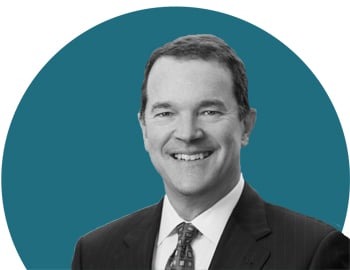How would you define your firm’s culture? How important is firm culture to you?
Culture is vitally important to our Firm and to me personally. We often talk about the V&E Family, which I believe is real. Our lawyers and administrative staff become part of that family when they join the firm. We have a huge alumni base that we communicate with on a regular basis. We also host an event where we invite all of our former lawyers to reunite with their colleagues. The atmosphere is electric as you witness dear friends, who started their careers together, reminiscing about their days at V&E.
I would venture to guess that few firms have that. My belief is that, in an era where the legal market is increasingly competitive for talent, our culture, which focuses on collaboration, working in teams, mentoring younger lawyers, and embracing diversity and inclusion efforts, make a huge difference in our ability to attract and retain our people.
What’s the main change you’ve made in the firm in the past few years that will benefit clients?
We have focused on ensuring that we have consistent excellence in all the areas that we choose to pursue. We have eliminated certain practice specialties that we thought were becoming commoditized or where we didn’t see opportunities for growth. We have spent an enormous amount of effort on communication across the firm to ensure we are aligned in our goals to be an elite global firm. This has required us, at times, to make hard decisions in where we invest our resources. In the last several years, we have strengthened our ranks and attracted quality laterals in key areas of growth for us, such as private equity and finance in London and New York and white collar and government investigations in Washington. If financial performance is any judge, we have been able to achieve record profitability the last two years and are on a path to have another record year in 2018.
What are the biggest misconception of Vinson & Elkins – do you find yourself pigeon-holed by historical reputations?
We have always been perceived as one of the premier energy firms in the world. While that is a core strength that we want to maintain, we actually are much broader in the overall practice areas we serve and compete in. Four years ago, we added a REIT practice to complement our leading capital markets practice. We represent the Panama Canal Authority on one of the largest construction disputes in the world. In fact, we have been involved in three of the four largest construction disputes around the globe. Our white collar, government investigations and IP work is largely non-energy. We are expanding our significant private equity practice in areas outside of energy. Our work in London involves clients in the telecom space, high-yield,
special situations, construction disputes and non-energy acquisitions. I believe that we will always dominate the energy space and that great work will continue to help us expand and grow across industries needing sophisticated legal work.
Differentiation is critical to buyers of legal services – how do you stand apart from the rest of the market?
Differentiation from your competition is critical to success. Clients today are much more sophisticated in hiring law firms. Many companies want to ensure your commitment to their needs and talk about “partnering with their outside law firms.” This requires that you develop a strong relationship, really listen to them, and understand their issues and needs. One way we stand apart is that our compensation system does not have formulaic origination credit. Those sorts of systems can incentivize lawyers to not work collaboratively, which can have negative repercussions for clients. We work hard at collaboration to assemble the best team for the particular assignment. We also have a very deep bench, which allows us to allocate substantial resources to meet our client needs in a cost-efficient way.
What do you think are the top three things most clients want and why?
Clients, above all, want an excellent legal team committed to their matters. We pride ourselves on making sure that we get to know our clients’ business and work tirelessly for them.
Clients also want practical and creative solutions. You need to not only identify the risks, but come up with suggestions about how to tackle the issues. Relationships in the legal business are key to building trust and delivering good advice. Many of the issues our clients face are difficult, and it is important to partner with them and help resolve those issues together. Having great judgment and an ability to communicate positions well are essential.
Clients don’t like surprises, and so we focus intently on staying ahead of them on the issues, making sure the value proposition is there and that we are viewed as delivering excellent results that are viewed as value-add by the client.
What have you found is the best way to retain talent – both at partner and associate levels?
Our lawyers are called everyday by other firms trying to entice them away. Fortunately, most have elected to remain, and I believe it is because of our culture, where we care about each other and we truly like working together. It is critical to have a compensation system that is competitive in the market for both associates and partners. Lawyers enjoy working on very sophisticated, high-profile transactions and cases.
People want to feel that they are a part of something special. It is our commitment to our lawyers that we offer great work, in an environment that fosters their ability to grow and excel in their field of expertise while developing close professional relationships. I like to think that although we are very serious about the legal work we do, we don’t take ourselves too seriously, and we enjoy practicing together and have a lot of fun doing it.
Recently, I have been pleased that we experienced the ‘boomerang effect’, where lawyers who left the firm return to rejoin our ranks, and they become the biggest advocates of how our culture really is truly special.
Since becoming chairman, what has surprised you most, either internally or externally?
We have spent a lot of time educating our lawyers about the economics of practicing law. I was surprised to see how eager our partners were to embrace the changing legal landscape. Competition is intense, and the way we practice has to change with it. Clients are more cost-conscious, and we must be able to still deliver excellent client service while we continue to train and grow the next generation of outstanding lawyers, and we must field more diverse teams in order to obtain outstanding solutions for our clients. We must embrace technology and invest in it becoming more efficient in how we deliver legal services today and in the future.
I’m not sure I fully appreciated the time and energy it has taken to maintain an active legal practice while leading the firm. Fortunately for me, I work alongside Scott Wulfe, our managing partner, and we operate extremely well together with the deep level of trust necessary to run a global law firm in today’s complicated world.

